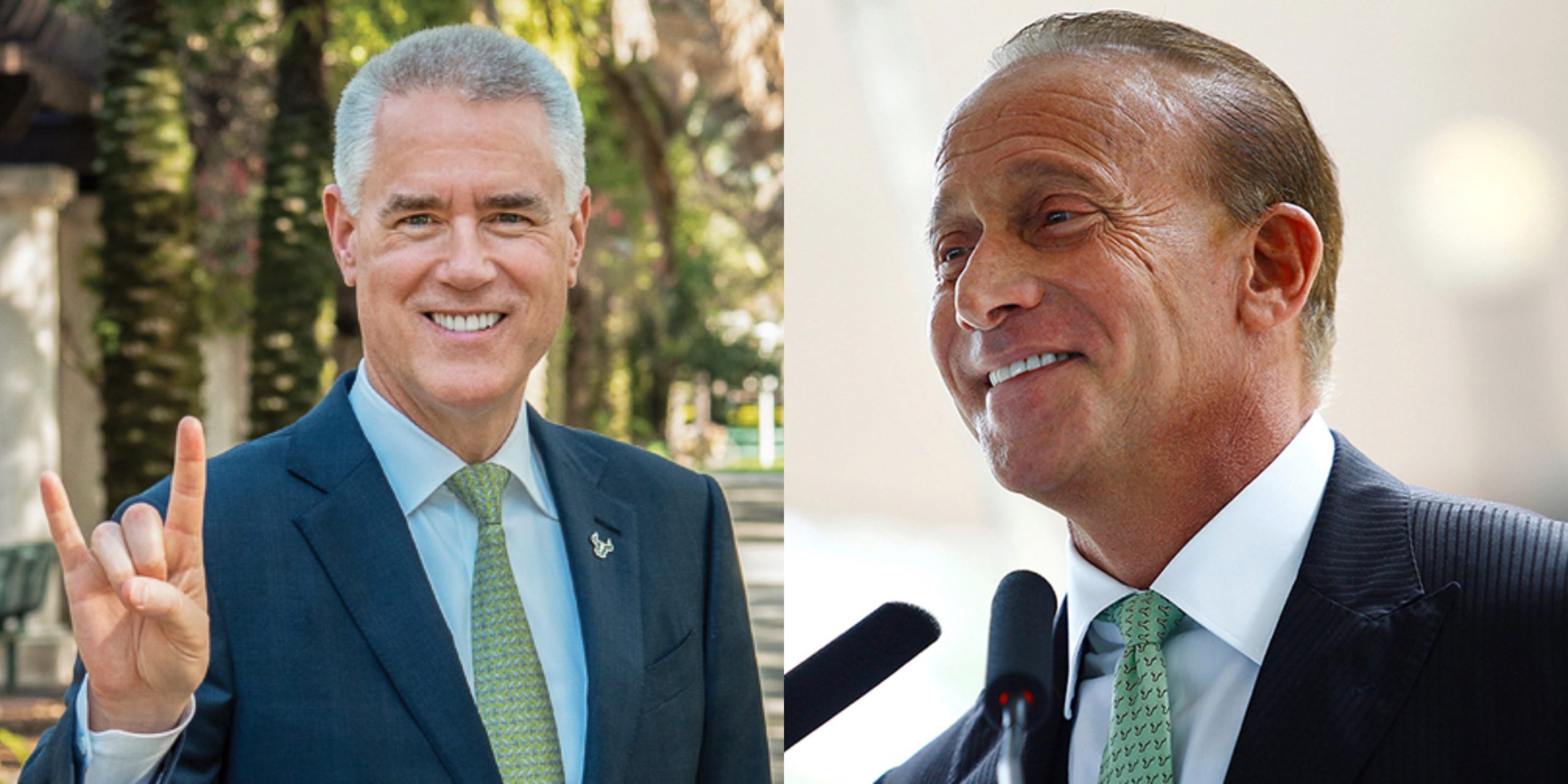Pictured Above: USF President Steve Currall (left) has drawn widespread criticism for his performance on consolidation and budget cuts, but trustees Chair Jordan Zimmerman praised him for “doing an excellent job.”
Courtesy of USF
By Nancy McCann
As controversy swirls around his administration, USF President Steve Currall intends to reduce an annual performance bonus of up to $275,000 this year.
Citing the “budget concerns now facing the university,” Currall told a USF Board of Trustees committee on Nov. 10 that he will “either defer or gift back some or all” of the bonus.
In an email Friday, university spokesperson Adam Freeman said Currall “intends to defer his performance compensation until at least the next fiscal year.”
Currall’s comments came after the trustees’ Governance Committee voted unanimously to award him 70 percent of the annual performance bonus of $275,000 stipulated in his contract. The remaining 30 percent is up to the discretion of board Chair Jordan Zimmerman.
Under the March 28, 2019, contract between Currall and the board, the president has an annual compensation package worth up to at least $977,000.
It includes a base salary of $575,000; 20 percent of that amount in deferred compensation; a $12,000 auto allowance; membership dues in professional and private clubs; university-related travel; a residence on campus; and a bonus – called “discretionary annual performance-based compensation” – of up to $275,000 if Currall meets certain goals.
Currall has already announced that he will take a 15 percent cut in his base salary. Members of his leadership team also agreed to take salary cuts of 6 to 10 percent to help the university deal with state-ordered budget reductions of 8.5 percent, or $36.7 million, by next June 30.
At the Nov. 10 meeting, the trustees enthusiastically praised Currall for his work since taking office July 1, 2019, citing in particular the challenges of consolidation and the COVID-19 pandemic.
“I would say that our president … is doing an excellent job,” Zimmerman said. “You never see him sweat.”
In turn, Currall thanked the trustees for “your confidence in me and your comments today.
“It really means so much to me to have your confidence and your support and your partnership and your wise counsel,” he said.
Later on, however, three members of another trustees committee were critical of the way the administration handled last month’s announcement about closing the College of Education and reconfiguring it into a school of education for graduate students.
They said they felt blindsided by administrators and a move of that magnitude should have involved the trustees.
The move prompted a firestorm of opposition from faculty, students, public school superintendents and elected officials, and almost immediately the administration began walking back the plan, calling it a “preliminary proposal.”
On Friday, administrators changed course. They announced that the university will continue to offer some “carefully selected” undergraduate degrees in education, but said the fate of the College of Education itself is still undecided.
In fact, controversy has dogged Currall and the university’s chief academic officer, Provost Ralph Wilcox, for months.
In St. Petersburg, their handling of consolidation has drawn pushback from faculty, business and community leaders, and – most ominously – key Pinellas County legislators who in 2018 orchestrated the end of USF St. Petersburg’s independence and put USF’s three campuses under a single accreditation.
One of those legislators, Sen. Jeff Brandes, R-St. Petersburg, has become an outspoken critic, prodding the administration to create a five-year plan designed to boost sagging enrollment in St. Petersburg and give the campus nationally distinctive academic offerings.
Brandes has said that legislators intend to implement more legislation on consolidation and closely examine the makeup of the Board of Trustees itself.
He has also said that the College of Education should be saved and moved to St. Petersburg.
That college has become Exhibit 1 in widespread faculty discontent about the way Currall, Wilcox and other administrators have approached budget cuts, potential layoffs and what they call a “strategic realignment” of the university while facing steep financial challenges.
On Oct. 30, 20 faculty leaders in the College of Arts and Sciences issued a blistering critique of administrators, accusing them of moving too hastily and unilaterally, cutting too deeply and skirting the guidelines of transparency and honesty stipulated in the university’s Principles of Community.
“Intelligent strategic realignment requires care, consideration and time,” the faculty leaders wrote.
On Nov. 18, members of the executive committee of the USF Faculty Senate voiced similar concerns.
They voted to create a committee to prepare a presentation for the trustees with “guiding principles” for budget cuts and a recommendation to slow the process down.
In their sometimes animated discussion, committee members used words like “covered up,” “obfuscating” and “loss of communication.”
The cuts the administration has proposed for the USF Libraries will jeopardize the university’s goal of winning admittance to the prestigious Association of American Universities, some members said.
Richard Manning, a professor of philosophy, lamented the lack of information.
“I’d just like to know why we can’t get a straight answer to the question: How much money in program cuts and faculty salary cuts are being made to free up money for strategic reinvestment later?” he said. “I mean it’s a pretty straightforward question … and there is no answer forthcoming.”
Administrators are “taking advantage of a (budget) crisis to fundamentally change things about the university they want to change,” Daniel Granke, an instructor in the School of Theatre and Dance, said.
“Somewhere along the line, there is a loss of communication between what administrators believe is good for everybody and what everybody believes is good for everybody,” said Steve Permuth, a professor of education and former dean of the College of Education.
“We have colleagues all over this campus scared to death about their lives and what they’re going to do.”



